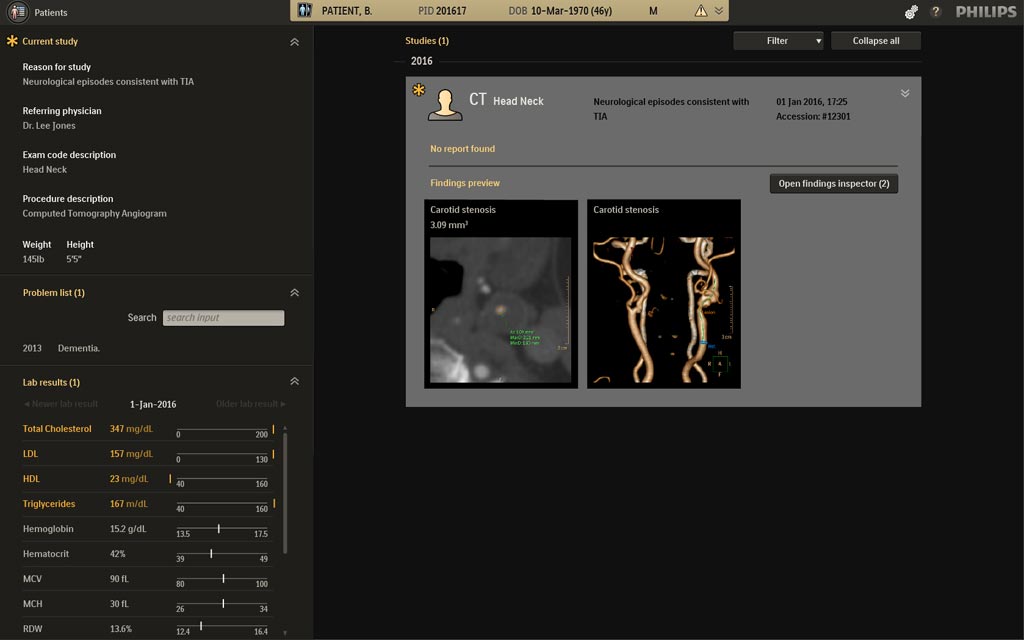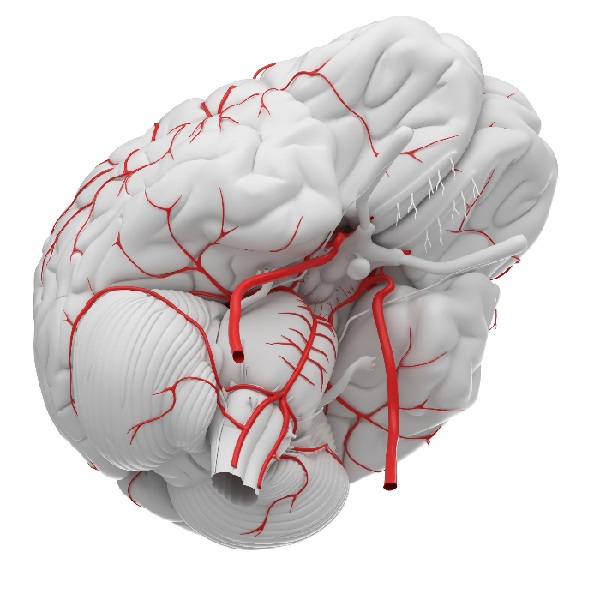Philips and Nuance to Bring AI Directly into Radiology Reporting
|
By HospiMedica International staff writers Posted on 21 Nov 2017 |

Image: A screenshot from the Illumeo imaging and informatics technology platform (Photo courtesy of Philips Healthcare).
Health technology company Royal Philips (Amsterdam, the Netherlands) and Nuance Communications, Inc. (Burlington, MA, USA), a provider of intelligent voice and language solutions, will jointly bring artificial intelligence-based (AI-based) image interpretation and reporting capabilities to radiologists.
Philips leverages advanced technology and deep clinical and consumer insights to deliver integrated solutions in diagnostic imaging, image-guided therapy, patient monitoring and health informatics, as well as in consumer health and home care. Nuance provides voice and language solutions for businesses and consumers around the world, and its technologies, applications and services transform the way people interact with devices and systems.
Their joint initiative will leverage assets from Philips Illumeo with adaptive intelligence and Nuance PowerScribe 360 to help reduce discrepancies, and improve radiology reporting, accuracy and standardization. Philips Illumeo, an imaging and informatics technology with adaptive intelligence, combines contextual awareness capabilities with advanced data analytics to augment the work of radiologists. Illumeo optimizes workflow and care consistency by providing a single view of the most relevant case-related information from various sources. The integration of Illumeo with Nuance PowerScribe 360, a real-time radiology reporting platform, will provide radiologists with access to a variety of tools at the point-of-care, including risk stratification, greater report accuracy and structure, faster turnaround times, and ability to more quickly and accurately inform the next step of care.
“Through this collaboration, Philips and Nuance demonstrate our commitment to deliver AI-based technology to help improve radiologists’ daily workflow and bring focus back to the patient,” said Yair Briman, Business Leader, Healthcare Informatics at Philips. “Pressured by time constraints and increased volume of studies in modern practice, radiologists will have access to AI-driven solutions and practical applications, including the integration of ACR guidelines, to help save time and effort while improving report quality.”
“Providing rapid and efficient generation of high-quality, actionable reports is necessary to drive the shift to value-based care while continuing to manage growing volume,” said Karen Holzberger, vice president and general manager, Healthcare Diagnostics, Nuance. “By accelerating the creation, access and usability of AI tools, the collaboration between Nuance and Philips will improve workflow efficiencies even further by reducing redundant tasks and helping better automate the reporting process.”
Philips leverages advanced technology and deep clinical and consumer insights to deliver integrated solutions in diagnostic imaging, image-guided therapy, patient monitoring and health informatics, as well as in consumer health and home care. Nuance provides voice and language solutions for businesses and consumers around the world, and its technologies, applications and services transform the way people interact with devices and systems.
Their joint initiative will leverage assets from Philips Illumeo with adaptive intelligence and Nuance PowerScribe 360 to help reduce discrepancies, and improve radiology reporting, accuracy and standardization. Philips Illumeo, an imaging and informatics technology with adaptive intelligence, combines contextual awareness capabilities with advanced data analytics to augment the work of radiologists. Illumeo optimizes workflow and care consistency by providing a single view of the most relevant case-related information from various sources. The integration of Illumeo with Nuance PowerScribe 360, a real-time radiology reporting platform, will provide radiologists with access to a variety of tools at the point-of-care, including risk stratification, greater report accuracy and structure, faster turnaround times, and ability to more quickly and accurately inform the next step of care.
“Through this collaboration, Philips and Nuance demonstrate our commitment to deliver AI-based technology to help improve radiologists’ daily workflow and bring focus back to the patient,” said Yair Briman, Business Leader, Healthcare Informatics at Philips. “Pressured by time constraints and increased volume of studies in modern practice, radiologists will have access to AI-driven solutions and practical applications, including the integration of ACR guidelines, to help save time and effort while improving report quality.”
“Providing rapid and efficient generation of high-quality, actionable reports is necessary to drive the shift to value-based care while continuing to manage growing volume,” said Karen Holzberger, vice president and general manager, Healthcare Diagnostics, Nuance. “By accelerating the creation, access and usability of AI tools, the collaboration between Nuance and Philips will improve workflow efficiencies even further by reducing redundant tasks and helping better automate the reporting process.”
Channels
Artificial Intelligence
view channel
AI-Powered Algorithm to Revolutionize Detection of Atrial Fibrillation
Atrial fibrillation (AFib), a condition characterized by an irregular and often rapid heart rate, is linked to increased risks of stroke and heart failure. This is because the irregular heartbeat in AFib... Read more
AI Diagnostic Tool Accurately Detects Valvular Disorders Often Missed by Doctors
Doctors generally use stethoscopes to listen for the characteristic lub-dub sounds made by heart valves opening and closing. They also listen for less prominent sounds that indicate problems with these valves.... Read moreCritical Care
view channel
Revascularization Improves Life Quality in Chronic Limb-Threatening Ischemia, Finds Study
Researchers have undertaken a detailed study to evaluate the effects of revascularization strategies on the health-related quality of life (HRQoL) of patients with chronic limb-threatening ischemia.... Read more
Powerful AI Risk Assessment Tool Predicts Outcomes in Heart Failure Patients
Heart failure is a serious condition where the heart cannot pump sufficient blood to meet the body's needs, leading to symptoms like fatigue, weakness, and swelling in the legs and feet, and it can ultimately... Read more
Peptide-Based Hydrogels Repair Damaged Organs and Tissues On-The-Spot
Scientists have ingeniously combined biomedical expertise with nature-inspired engineering to develop a jelly-like material that holds significant promise for immediate repairs to a wide variety of damaged... Read more
One-Hour Endoscopic Procedure Could Eliminate Need for Insulin for Type 2 Diabetes
Over 37 million Americans are diagnosed with diabetes, and more than 90% of these cases are Type 2 diabetes. This form of diabetes is most commonly seen in individuals over 45, though an increasing number... Read moreSurgical Techniques
view channel
Miniaturized Snake-Like Probe Images Cerebral Arteries From Within
Endovascular interventions are being increasingly favored for treating strokes and cerebral artery diseases, but rely heavily on angiographical imaging that often struggles with limited contrast and spatial... Read more
Miniaturized Implantable Multi-Sensors Device to Monitor Vessels Health
Researchers have embarked on a project to develop a multi-sensing device that can be implanted into blood vessels like peripheral veins or arteries to monitor a range of bodily parameters and overall health status.... Read more
Tiny Robots Made Out Of Carbon Could Conduct Colonoscopy, Pelvic Exam or Blood Test
Researchers at the University of Alberta (Edmonton, AB, Canada) are developing cutting-edge robots so tiny that they are invisible to the naked eye but are capable of traveling through the human body to... Read more
Miniaturized Ultrasonic Scalpel Enables Faster and Safer Robotic-Assisted Surgery
Robot-assisted surgery (RAS) has gained significant popularity in recent years and is now extensively used across various surgical fields such as urology, gynecology, and cardiology. These surgeries, performed... Read morePatient Care
view channelFirst-Of-Its-Kind Portable Germicidal Light Technology Disinfects High-Touch Clinical Surfaces in Seconds
Reducing healthcare-acquired infections (HAIs) remains a pressing issue within global healthcare systems. In the United States alone, 1.7 million patients contract HAIs annually, leading to approximately... Read more
Surgical Capacity Optimization Solution Helps Hospitals Boost OR Utilization
An innovative solution has the capability to transform surgical capacity utilization by targeting the root cause of surgical block time inefficiencies. Fujitsu Limited’s (Tokyo, Japan) Surgical Capacity... Read more
Game-Changing Innovation in Surgical Instrument Sterilization Significantly Improves OR Throughput
A groundbreaking innovation enables hospitals to significantly improve instrument processing time and throughput in operating rooms (ORs) and sterile processing departments. Turbett Surgical, Inc.... Read moreHealth IT
view channel
Machine Learning Model Improves Mortality Risk Prediction for Cardiac Surgery Patients
Machine learning algorithms have been deployed to create predictive models in various medical fields, with some demonstrating improved outcomes compared to their standard-of-care counterparts.... Read more
Strategic Collaboration to Develop and Integrate Generative AI into Healthcare
Top industry experts have underscored the immediate requirement for healthcare systems and hospitals to respond to severe cost and margin pressures. Close to half of U.S. hospitals ended 2022 in the red... Read more
AI-Enabled Operating Rooms Solution Helps Hospitals Maximize Utilization and Unlock Capacity
For healthcare organizations, optimizing operating room (OR) utilization during prime time hours is a complex challenge. Surgeons and clinics face difficulties in finding available slots for booking cases,... Read more
AI Predicts Pancreatic Cancer Three Years before Diagnosis from Patients’ Medical Records
Screening for common cancers like breast, cervix, and prostate cancer relies on relatively simple and highly effective techniques, such as mammograms, Pap smears, and blood tests. These methods have revolutionized... Read morePoint of Care
view channel
Critical Bleeding Management System to Help Hospitals Further Standardize Viscoelastic Testing
Surgical procedures are often accompanied by significant blood loss and the subsequent high likelihood of the need for allogeneic blood transfusions. These transfusions, while critical, are linked to various... Read more
Point of Care HIV Test Enables Early Infection Diagnosis for Infants
Early diagnosis and initiation of treatment are crucial for the survival of infants infected with HIV (human immunodeficiency virus). Without treatment, approximately 50% of infants who acquire HIV during... Read more
Whole Blood Rapid Test Aids Assessment of Concussion at Patient's Bedside
In the United States annually, approximately five million individuals seek emergency department care for traumatic brain injuries (TBIs), yet over half of those suspecting a concussion may never get it checked.... Read more
New Generation Glucose Hospital Meter System Ensures Accurate, Interference-Free and Safe Use
A new generation glucose hospital meter system now comes with several features that make hospital glucose testing easier and more secure while continuing to offer accuracy, freedom from interference, and... Read moreBusiness
view channel
Johnson & Johnson Acquires Cardiovascular Medical Device Company Shockwave Medical
Johnson & Johnson (New Brunswick, N.J., USA) and Shockwave Medical (Santa Clara, CA, USA) have entered into a definitive agreement under which Johnson & Johnson will acquire all of Shockwave’s... Read more














